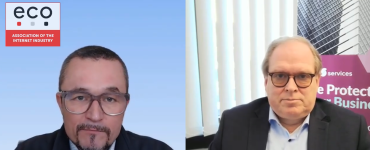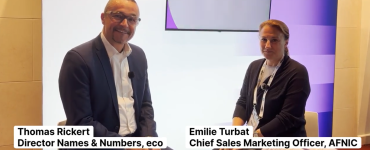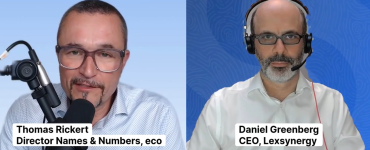eco International interviewed Neal McPherson (Portfolio Manager at 1&1 Internet SE) & Tobias Sattler (Chief Information Officer at united-domains AG & Vice Chairmen of the ICANN Registrar Stakeholder Group) on their joint RFC proposal for a standardized Registry Reporting Repository for accredited domain name registrars.
eco: For those who don’t know you: Who are you, and what do you do?
Neal McPherson: I’m a Portfolio Manager at 1&1 Internet SE, where I manage our relationships with registries and external partners.
Tobias Sattler: I’m the Chief Information Officer (CIO) at united-domains AG and one of the Vice Chairs of the Internet Corporation for Assigned Names and Numbers (ICANN) Registrar Stakeholder Group. In this position, I also oversee the joint Registry and Registrar TechOps initiative, which is designed to address technical and operational challenges in the domain industry.
eco: What exactly is a Registry Reporting Repository?
Neal: A Registry Reporting Repository is a standardized document repository managed by domain registries for their accredited registrars. Some registries generate numerous reports which can be used by registrars for their daily work, such as financial analysis, transaction lists, premium domains, blocked domain names, etc. These documents can vary considerably in scope and content. The objective of our proposal is to establish a standardized system that will make it easier to access relevant documents and reports.
Tobias: Our draft requires that each registry operates an SFTP server with the same basic configuration. The individual documents and their formats are not included in our proposal. We would like to keep these separate from each other in order to facilitate and speed up a possible adaptation as an RFC.
eco: What is an RFC?
Tobias: RFC stands for “Request for Comments” – meaning technical and organizational documents that either describe an Internet standard or have an informative or experimental nature. RFC can come from many sources, such as the Internet Engineering Task Force (IETF), the Internet Research Task Force (IRTF), the Internet Architecture Board (IAB) or independent authors.
eco: What does a Registry Reporting Repository offer and who benefits from it?
Neal: Most registries already have their own system, but they often have a different structure. The aim of our proposal is to create and establish a unified standard in order to make it much easier for registrars to use these repositories.
Tobias: In the long term, a standardized system would allow more registrars to use the reports provided by registries, and the industry will benefit through increase in understanding that arises from this.
eco: Why did you decide to write an RFC?
Neal: When I submitted the first proposal for this topic to the TechOps initiative, it was not my intention to write an RFC. However, it became clear from the discussions that an RFC would increase the overall acceptance for the proposal. This is why we decided to follow this path and we hope we can bring it to a successful conclusion.
Tobias: An RFC has a certain status, which makes it easier to refer to in discussions. The work on another Registry Maintenance Notifications draft has also familiarized me with the IETF process, so I wanted to help Neal to publish a document as soon as possible, so that his proposal didn’t get bogged down.
eco: You have now submitted a draft – what happens next?
Tobias: The first draft has been submitted to the IETF and is open for comments. We are looking forward to feedback. However, this document is only the first of many more steps. We want to discuss and improve the draft further in the TechOps initiative. If there are no additional proposals or requests for amendments, we will submit this draft to the IETF REGEXT Working Group in order to have it adopted as Best Current Practice RFC.
eco: Do you have already other ideas?
Neal: Of course, we also want to submit another RFC draft for the documents themselves, so that not only the SFTP server, but also the structure and content of the reports can be standardized. This would greatly simplify automated evaluation and further processing.
Tobias: In addition, there are many other topics that we are looking at in the TechOps initiative. We want to use the momentum to discuss new ideas and, if appropriate, submit them as an RFC.
eco: Thank you for your time and insight. We wish you all the best with your initiative!
Both: You are welcome!




